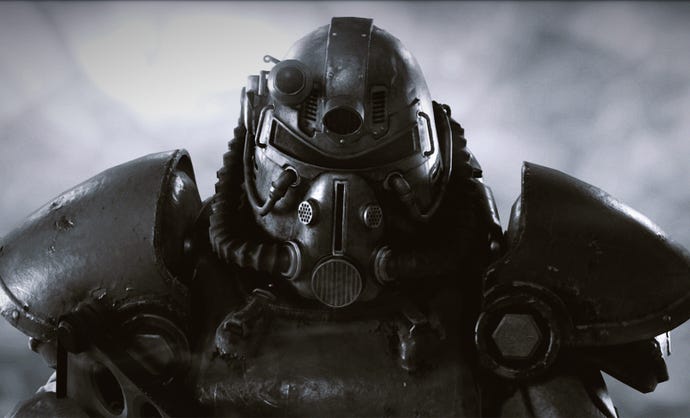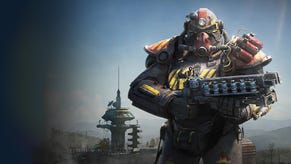Fallout 76 players don't talk to each other - they've got something better
“These are not mine,” reads the crumpled note, in handwritten scrawl. “Not anymore. Perhaps they will give you the comfort that I have lost.”
Ordinarily, Fallout 76 players would find this letter in a mole rat-infested church in Charleston - Bethesda’s level design team placed it inside a coffin. That’s not where I’m reading it. Instead it’s in a paper bag at the feet of a visitor on the decking of my camp, alongside a handful of plans for weapons and enough food supplies to see me through the day. A gift. It’s not the message the note was written to convey - but it makes sense in this new context, repurposed by players.
Since my partner and I built our post-apocalyptic riverhouse - spacious, detached, one bedroom - we’ve become well-practised in hosting other players. Situated at a crossroads just outside Morgantown, an early stop in Fallout 76’s main quest, our home sees a lot of traffic. We’ve become accustomed to noticing the map markers highlighting curious players appearing on the porch, throwing the front door open, and ushering them in. Down they come, past the potted plants and irradiated milk dispenser, out into the glue garden where we grow crops for the vegetable starch that holds our guns together, and over to the purifier that glugs water straight from the stream and cleans it for public consumption. Essentially we’re reliving Liam Neeson's plan for Project Purity in Fallout 3, reducing the water pollution of the wasteland, only one resident at a time.
What we’ve found is that in this oddly benevolent survival game, generosity begets generosity. Once weighed down with plastic bottles filled with sweet H20, guests often disappear inside to find our stash box. They’re not stealing, since Fallout 76 stash boxes link to the stored goods of whoever opens them. Instead they’re checking for stuff they’re happy to part with. Blueprints they’ve already learned, food they can’t fit in their bellies before it goes off, bundles of stimpacks, entire power armour stations - we’ve seen the lot dumped gratefully on our doorsteps.
Where it gets really interesting, though, is in how this exchange is communicated. While Fallout 76 is filled with voices - recorded on holotapes and transcribed onto terminals, replacing the game’s absent NPCs - almost none of them belong to players. It’s extremely rare to hear the telltale heavy breathing of the game’s radius-based mic chat. That’s probably symptomatic of an audience primarily inherited from the long-running single-player games, naturally drawn to solo exploration and wary of other players. The humans of this West Virginia are mostly mute, leaving the words to John Denver and the rest of the crooners on the radio.
Unfortunately, Fallout 76’s emote system isn’t particularly comprehensive either. On the default wheel, there’s no way to say goodbye, no way to apologise for accidentally slugging a stranger in the shoulder during a panicked ghoul encounter. It doesn’t help that many of the subtler expressions are saved for the store, earned either via a trickle of challenge completion points or real money.
Instead, just occasionally, we’ve started to see players speak with the voices they find in the world. Environmental storytelling has been a part of Bethesda games for decades - particularly in the Fallout universe, which is as much concerned with the lives of people in its alternate October 2077, the month the bombs fell, as those in its present day. Yet Bethesda’s efforts have stagnated while others have pushed the form forward. In Gone Home, indie developer Fullbright was able to layer the histories of several characters across a single space by asking you to dig up the stories of just one house. And in Firewatch, a walkie talkie turned objects into prompts for conversation, changing environmental storytelling from archaeology to live improv.
Fallout 76’s buried stories, while often masterfully told through meticulous object placement and snippets of script, are no different in style to those you could find in Fallout 3 ten years ago. But unexpectedly, its players are taking those tools and doing something completely new with them, speaking to each other in a fashion Bethesda couldn’t have predicted.
We’re back at camp, but not at our riverhouse - instead it’s an open air arrangement of workbenches huddled around a wood fire, left behind by the Overseer for new players to discover after they stumble, blinking, from Vault 76. A level 7 survivor hammers away at a piece of armour, but as we watch, his health bar slowly dwindles - he’s starving.
A couple of donated mole rat chunks later, he’s saved. In return, there’s another paper bag on the ground - this time containing just a recorded message, titled ‘Jacob’s holotape part 3’. It’s one element of a multi-stage story told across a shopping mall, about a man deliberately sent into danger so a fellow survivor can steal his girlfriend. But here that doesn’t so much matter. As Jacob monologues about scavenging for old candy bars, it’s clear our level 7 friend is telling us about his own experience struggling to stay fed. He’s grateful for the intervention - and a holotape said it better than any mumbled thank you over a PlayStation mic ever could.












